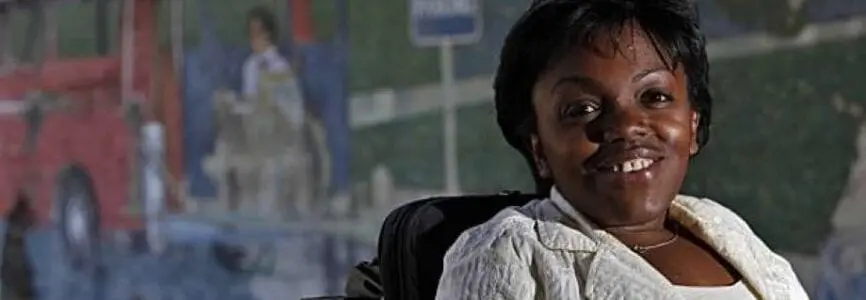Hastings Center News
What Does It Mean to Move Through the World with a Disability?
The answer to that question is not straightforward, as was made vivid in “Navigating: On Disability, Technology, and Experiencing the World,” a recent virtual event. It was the second in a series of events produced by The Hastings Center and supported by the National Endowment for the Humanities that explores the ways in which people with disabilities choose to use – or choose not to use – technologies to promote their own flourishing.
The event featured three panelists who told personal stories about their experiences with different technologies that have helped them move around in the world.
The first speaker was Yomi Wrong, a freelance journalist and justice activist who was born with a condition that causes extremely brittle bones. She chooses to navigate in a wheelchair, but she recounted a painful experience from when she was 9 years old and was forced to use a different technology for a trip to the movies. “The story I chose today is very tender to me and I am nervous to share it,” she said. Watch a video clip of Yomi Wrong.
Rod Michalko, a disability studies theorist who teaches at the University of Toronto, spoke next. He is blind, and the technology he discussed was his guide dog, Smokey. “My left hand on his harness and a simple, ‘Forward, Smokey,’ we entered places that were our world,” he said. “We were not merely one more of ‘them’. We were distinct. We were the sight of blindness, not as the banality but as the richness of distinction . . . [T]he world opened for us and Smokey and I elegantly entered it.” Watch a video clip of Rod Michalko.
The third speaker was Kim Q. Hall, a professor of philosophy and women’s studies at Appalachian University. Hall was born with a malformed hip. After surgery and wearing body braces, Hall was pronounced “fixed” by orthopedists. “I walked, but with a difference,” Hall said. “In my remarks today, I want to reflect on why this difference matters.” Watch video clip of Kim Q. Hall.
A lively discussion followed, with questions from the audience.
The series is directed by Erik Parens, a senior research scholar at The Hastings Center, and co-directed by Joel Michael Reynolds, assistant professor of philosophy and disability studies at Georgetown University and a senior research scholar in the Kennedy Institute of Ethics. Chief project advisor is Rosemarie Garland-Thomson, professor of English and bioethics at Emory University, and senior advisor at The Hastings Center. Learn more about the series.

